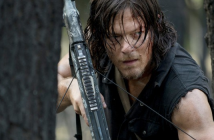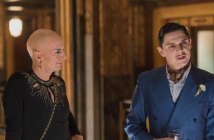April 12, 2015, 9:00 p.m. (EST), HBO
The future is an idea, more than anything. It’s a vague notion, prediction or fantasy, hopes or fears, prophecy or guesswork. The future is an abstract until it becomes the present and, all too quickly the past. Those things exist. Those things are solid, they direct us, they’ve changed us. But that doesn’t mean the future doesn’t have a pull on us as strong as that of the past. The future is potential; its all we can be, its all that we want to be. The past controls us, constricts us, shapes what we want. But the future represents those wants, and it casts a strong pull on the present. It’s the difference between who we are and who we want to be, what we have, and what we want.
“The Wars to Come,” is, appropriately for a season premiere, deeply concerned with the future. Though it begins in the past, even Cersei’s flashback deals with her learning her own future, and shapes how she thinks about the world and about what threatens her well into adulthood. That focus is also apt for the point we find ourselves in the series, the point at which we are almost certainly going to begin to see Game of Thrones divert in significant ways from its source material, A Song of Ice and Fire. As readers of this space know, I have read all of the books (though I do pledge to keep all spoilers clearly demarcated and at the end of The Roundup so viewers who haven’t read the books can proceed unspoiled), and that knowledge has absolutely colored my views on the series, both in terms of how it translates the books, and in terms of how effective it is when it chooses to diverge. That knowledge will continue to effect how I think about the show, and will inform how I approach it here. But we are entering uncharted waters this season. The knowledge I have will begin to mean less and less. At some point, it may mean nothing at all, beyond me understanding backstory the show has yet to illuminate (and may never share). My past, with this show and with the books that inspired it, weighs heavily on my approach to it. But tonight, I am concerned with the future.
This season opens with Cersei for a reason. Her place in the hierarchy of Westeros is more tenuous now than it has been in seasons past, but its also more free than she has been in her entire life. While Tywin lived, he kept her safely ensconced in a life of privilege, but could never see past her biology to the fierce and pragmatic person he raised. So long as Tywin lived, Cersei was never going to be more than his second child, his daughter, his pawn to be used to better the family, but never to better herself. Now, Cersei is the highest ranking Lannister alive, and ostensibly the only one who still cares about her family’s legacy, what with Jaime’s dedication to the King’s Guard and Tyrion’s dedication to drinking himself to death. Cersei is certainly defined by her past, as we find her tonight. But she’s also granted an opportunity to grasp a future far different from the one that has been planned for her. She’s long been a first class schemer. Its only now that she gets to find out whether the seat Tywin left at the head of the table can be filled by her.
Across the narrow sea, Tyrion is similarly preoccupied with the past, but enamored by the future. Varys’ speech is one that nakedly appeals to Tyrion’s sense of himself as a good person in a world of bastards, as the sort of man who might be a hero if only the world would give him a chance. Tyrion is blatantly at a fork in the road in “The Wars to Come”: he is offered a choice between drinking himself to death in Pentos and taking a chance that he might find something worth fighting for in Meereen. Given the choice between cynicism and optimism, Tyrion still chooses to believe there is something good in the world, something that might change his mind about the future being just as black and useless as his past. Tyrion could choose to die tonight. But instead, he chooses to live.
Dany, too, finds it hard to rely on her past as she attempts to chart the best course forward for the kingdom she has chosen to rule. Her status as a liberator doesn’t give her the tools she needs to rule a free city; the cachet she gained by freeing the slaves cannot pacify their former masters. Dany’s problem isn’t a lack of vision for the future; she sees herself presiding over a time of peace. Her problem is an inability to see the steps between her current situation and her ideal. She has a dream house. She just doesn’t yet have a blueprint.
At the wall, we come up against two conflicting visions for the future. Stannis sees himself on the throne, and the Wildings as his best path there. Jon Snow agrees, at least insofar as he believes the best course for the Free Folk is to bend the knee to Stannis, to gain a chance of land and citizenship should their new ruler prevail. Mance Rayder, on the other hand, sees that course as one that would rob the Wildlings of everything that defines them. He is willing to die for the idea that each man should be free to chart his own course, free to make his own mistakes, free to decide who he will be. Mance’s vision of the future isn’t a personal one so much as a political one. He’s willing to die for an ideal, because he believes that choice has the power to change minds, to live beyond him and convince his people that freedom is a goal worth fighting for and dying for if necessary.
Every season, Game of Thrones spends its premiere dancing from storyline to storyline, trying to check in with everyone of import, update viewers as to where things stand, and remind them of where we’re coming from. This show’s premieres carry a heavier weight than most, and “The Wars to Come” bears it better than many premieres in the past have managed. The key is the thematic throughline, and the way these characters are all focused on the future and all it might offer them, if they live to see it and make the right moves. The future is always uncertain, for us as viewers now more than ever. But it offers hope. The future is a promise we make to ourselves, a dream that may yet exist out there, just beyond our reach. Reality is fast approaching, threatening to crush our dreams, or divert them into unimagined tributaries. But so long as there’s tomorrow, there’s a chance it will be everything we imagine. There’s a chance it might be something better.
The Roundup
- “You’re not terrifying. You’re boring.” “You don’t know what I am.”
- “Everyone wants to know their future. Until they know their future.”
- “The future is shit. Just like the past.”
- “All I ever wanted was to fight for a lord I believe in. But the good lords are dead, and the rest are monsters.”
- “I lead you into the darkness.” ” I doubt you ever lead anyone anywhere.”
- “There are faster ways to kill yourself.” “Not for a coward.”
- “Compassion, yes. I killed my lover with my bare hands and shot my father with a crossbow.” “I didn’t say you were perfect.”
- “I think you’re making a terrible mistake.” “The freedom to make my own mistakes was all I ever wanted.”
- SPOILERS: So this section will likely quickly become speculative, as the show has promised to move further and further from the books, and yet, we trudge on. If the show is staying true, Mance Rayder is, of course, not dead. I’m not sure that keeping him alive serves any purpose the way the show has been playing the character, and yet, Ciaran Hinds is such a lovely performer, I would not mind seeing more Mance, even though his is a story that might be somewhat compromised by the visual medium in which this series is being told. Beyond that, all of the big events coming are in flux. I know that this season promises to adapt two fairly unpopular books in the series, but I think there is a lot of great material here, should the show decide to tackle it. Casting tells me they are avoiding the Ironborn like the plague, which is a shame, but there is still a chance to mine Dorne for all its worth.
“The Wars to Come,” is, appropriately for a season premiere, deeply concerned with the future.
-
GOOD




